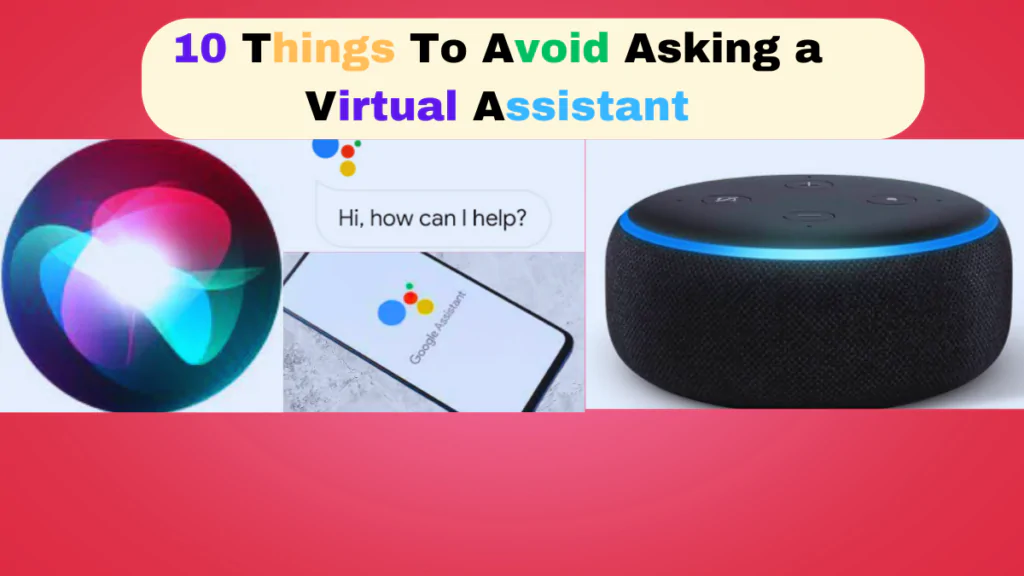In today’s world, virtual assistants like Siri, Google Assistant, and Alexa are important part of our life. They can do many things, like remind you and play music, just by listening to your voice command. However, while these virtual assistants are incredibly helpful, there are certain things you should never ask them. Here are ten things you should avoid asking Siri, Google Assistant, or Alexa.

1. Personal or Sensitive Information
One of the most important things to remember is to never ask your virtual assistant for personal or sensitive information, such as your passwords, bank account details, or social security number. These assistants are designed to respect your privacy and are not programmed to handle such confidential information.
2. Inappropriate or Offensive Content
It’s important not to ask your virtual assistant for inappropriate or offensive content, like jokes or stories with offensive language. These assistants are family-friendly, so make sure your requests are suitable for everyone.
3. Medical or Legal Advice
While virtual assistants can provide general information on a wide range of topics, it’s best to avoid asking them for medical or legal advice. They are not qualified professionals and should not be relied upon for such important matters. If you have medical or legal questions, it’s always best to consult with a qualified professional.

so in medical related matter or legal matter it’s better to ask a real professional for help with these important matters.
4. Dangerous or Harmful Actions
It’s really important to never ask your virtual assistant for advice on doing anything harmful or dangerous. Asking them for advice on harmful actions, such as how to hurt yourself or others, goes against this principle. These assistants are programmed to promote positivity and provide helpful information, so it’s best to ask them questions that align with these values.
If you ever feel the need to harm yourself or others, it’s crucial to seek help from a trusted individual or professional who can provide the support you need.
5. Complex or Confusing Commands
Virtual assistants are smart, but they might get confused by complex commands. To avoid misunderstandings, make sure your requests are clear and short. If your assistant has trouble understanding, try saying it in a simpler way.
6. Malicious Commands
Some people have tried to fool virtual assistants into doing bad things, like buying things or accessing restricted stuff. In recent years, there have been reports of people trying to trick virtual assistants into performing malicious actions, such as making inappropriate purchases or accessing restricted content. It’s important to remember that these assistants are designed to follow your commands, so be mindful of the requests you make and avoid any malicious intent.
so don’t try to trick them into doing anything wrong.
7. Asking for Passwords or Access Codes
Never ask your virtual assistant for passwords, access codes, or any other sensitive information like credit/debit card no, cvv etc.. that could compromise your security. Virtual assistants are not designed to keep your information very safe, and asking for such information could put you at risk of being hacked or scammed.
8. Making Threats or Harassing Comments
It’s important to be kind to virtual assistants like Siri, Google Assistant, and Alexa. Asking them to say mean or threatening things is not okay. These assistants are designed to help and be friendly, so it’s best to use them in a nice way.
Also It’s important to remember that virtual assistants are designed to promote positivity and safety. Asking them to make threats or harassing comments is not only inappropriate but also goes against the principles of responsible use. Always use your virtual assistant in a respectful and considerate manner.
9. Seeking Emotional Support or Counseling
Virtual assistants can give information on many things, but they can’t give emotional support or counseling. If you are in need of emotional support, it’s best to speak with a trained professional who can offer you the help and guidance you need.
10. Unreasonable or Impossible Requests
Lastly, it’s important to avoid making unreasonable or impossible requests to your virtual assistant. So don’t ask your virtual assistant for things that are impossible or unreasonable. They can perform a wide range of tasks, and there are limits to what they can do. Be careful of the requests you make and avoid asking for things that are beyond their abilities.
Recent Test during Emergency
In a study, voice assistants were asked about what to do during a heart emergency. Most did not say to call emergency number based on your country first, which is the most important step. Instead, they just suggested looking up CPR online, showing the need for them to give better advice during emergencies.
According to Fox News, a recent study tested voice assistants’ responses to cardiac arrest scenarios. The findings were concerning. Only nine out of 32 voice assistants said to call emergency number during a heart emergency. Shockingly, 88% just suggested looking up CPR online, showing the need for better advice in emergencies.
Conclusion
In short, virtual assistants such as Siri, Google Assistant, and Alexa can make our lives easier. But we must use them wisely and not ask for personal or inappropriate things. Following above tips will help you use your virtual assistant safely and enjoy its benefits.








